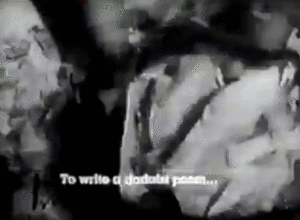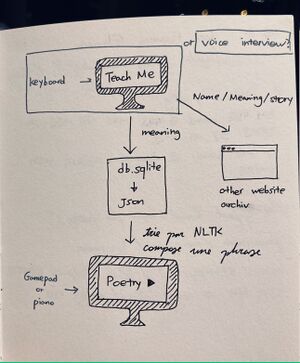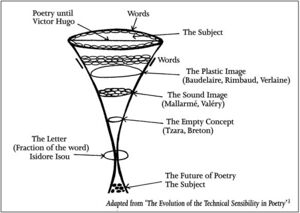User:Euna/Graduation: Difference between revisions
(Created page with "=Draft Project Proposal= ==What do you want to make?== I’m going to make computational sound poetry through collecting meanings of words. File:Comp-poetry.gif|thumb|compu...") |
|||
| Line 107: | Line 107: | ||
== Who can help you and how?== | == Who can help you and how?== | ||
Manetta and Michael for conceptual and technical matters. | Manetta and Michael for conceptual and technical matters. | ||
Aymeric for authorship and license. | Aymeric for authorship and license. | ||
Participants from various backgrounds to nourish my database. | Participants from various backgrounds to nourish my database. | ||
==Relation to previous practice== | ==Relation to previous practice== | ||
Revision as of 13:27, 7 October 2021
Draft Project Proposal
What do you want to make?
I’m going to make computational sound poetry through collecting meanings of words.
Suggestion 1.
This project will question the ownership of the language and poetry.
1) Language : as each person has their own linguistic background and personal experience, everyone can experience linguistic confusion and sometimes, create a new language. Even the computer translation does. But many people believe the standard language, so they judge the others as « Wrong ». Through making a collective dictionary, I challenge that belief, as the poetic license does.
2) Poetry : in parallel with language, we believe that the haiku belongs to Japanese, Sonnet to western people and Poetry to human. I’ll delegate the poet’s role to computer; selecting the word and making a musicality.
Suggestion2.
Derrida : Language has lots of possibilities to be translated differently -> meaning is not fixed, signifier / signified relation is just accidental. Computer-generated poetry -> randomness = accident (In the project, I only treat the human language. Maybe for the thesis, how different human / computer language? And can computer language be used as a source of poetry, possible? How are the computer language and human language different and similar?)
How do you plan to make it?
For now, I’m reading « Prehistoric Digital Poetry Book by Chris Funkhouser ».
Keywords for coming research :
- Computational writing
- computational poetry
- sound poetry
- translation
- language
- Collective archive
- Participatory art
Practice
with python.
Flask to create web sites and NLTK to compose sentences.
1) A software or a web site to make computational (sound) poetry.
As the spectator control the input (not a normal keyboard! But, game pad button or piano keyboard) computer plays correspond sound and shows sentences composing with the collected meanings.
2) A digital space where the spectator can register their word; after listening to a pronunciation, he/she write its meaning (from a dictionary or personal story) and origin. This will be served as a database to make computational poetry.
3) Collective Dictionary or Archive of 2
What is your timetable?
These are the key dates for 2021-22
19 November - Graduate Proposal Deadline Last year's Graduate Proposals UPLOAD YOUR PROPOSAL HERE! 19 November - Thesis Outline Deadline Last year's Thesis OutlinesUPLOAD YOUR THESIS OUTLINE HERE! 3 Dec - Deadline First Chapter 18 Feb - Deadline First Draft Thesis 18 March - Deadline Second Draft thesis (texts to 2nd readers) 1 April - Deadlines Second readers' comments 14 April - DEADLINE THESIS
- Oct - Nov
Make a php website to collecting the meaning
Test the collection (vocal interview and small meaning exchange exercise)
Continue to read
- Dec - Jan
Continue to collect the meaning (invite the people actively)
Make a collective dictionary
- Feb - March
Make a web for the poetry (Json database as NLTK source and compose phrase)
- April - May
Make all webs and installation work
Why do you want to make it?
After my personal English dictionary project, I wanted to make another one with a wider scope.
1) Everyone experiences the linguistic confusion (in everyday life and whenever google translate the website…). I wanted to make a space to share that experience and share their poetic mistake.
2)Wiktionary is also a co-authored dictionary, but only with lexical meanings. In poetry, the personal experience or the signification as a social promise don’t really matter. In my project, all meaning has the same value.
Who can help you and how?
Manetta and Michael for conceptual and technical matters.
Aymeric for authorship and license.
Participants from various backgrounds to nourish my database.
Relation to previous practice
During SI15, I did voice performances and as a result of awkwardness of my English (especially pronunciations), I made dictionary with my English. This language question stretches back to my previous project in bachelor; poetry with homonyms between Korean and French words. Also, I made computational poetry like poetry (not really automated, because of lake of my coding skill…)which I codified the number of supermarket merchandise’s barcodes to listen to what they want to say in human language.
Relation to a larger context
Randomly generated digital works, works that appear in sequences (either static or animated), and many hypertexts (which are typically presented as a series of interlinked fragments) embody the type of postmodern conditions of textuality put forth by Derrida, Baudrillard, Foucault, Deleuze and Guattari, and others. (Chris Funkhouser, Prehistoric Digital Poetry Book)
References/bibliography
Read
- Vilem Flusser, Does writing have a Future?
- Chris Funkhouser, Prehistoric Digital Poetry Book
- Nicoline van Harskamp, My Name Is Languages
- Olia Lialina, Digital Folklore
- Ivan Junqueira, Is poetry untranslatable? (https://hogeschoolrotterdam.on.worldcat.org/v2/search/detail/8598237785?queryString=Untranslatable%20Terms%20Of%20Cultural%20Practices&stickyFacetsChecked=on&clusterResults=true&groupVariantRecords=false)
- Michaële Hancher, Humpty Dumpty and verbal meaning (https://www.jstor.org/stable/430352?origin=crossref)
Project
- Antoni Muntada, The file Room, https://rhizome.org/editorial/2016/nov/17/antoni-muntadas-the-file-room/
- Antonio Roberts AKA Hellocatfood commission, http://www.electronicvoicephenomena.net/index.php/sp3l-aend-spik-antonio-roberts-aka-hellocatfood-commission/
- Transcommunautaire Karaoke Transcommunautair, https://gallery3.constantvzw.org/index.php/Transcommunautaire-Karaoke-Transcommunautair
- ParlezVous1016, https://www.parlezvous1060.be/fr/w/Allumette.html
- Steve Reich’s Different Trains https://www.youtube.com/watch?v=qcGqVynCPaw



